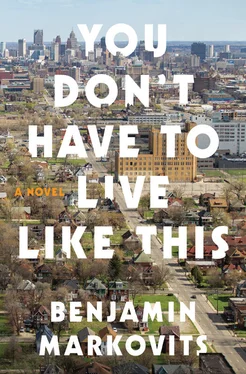When I woke up the next morning, I had ten or twenty seconds of real confusion. Partly because of jet lag. It didn’t feel like waking up, it felt like being hit on the head and slowly coming back to consciousness. I was lying on the bottom half of a bunk bed and looking out, through an arched window, at a sycamore tree full of campus sunshine. It took me a while to get my bearings, to realize where I was. But even after I did, for ten or twenty seconds, I couldn’t remember what I was doing there — how old I was, or if I had to make a class. Then I remembered and the hangover kicked in, but that didn’t matter because the years were gone anyway.
After breakfast in dining hall, I caught a train to New York. This gave me two hours to screw my head on straight. It’s not a bad journey. I liked looking at the waterside mansions, the poky harbors, the bays, and later on, the big industrial views of Bridgeport and the row houses of Queens. Some of my classmates rode that train to work; some of them had summerhouses on the water. At Grand Central, I transferred to Penn Station and bought a Greyhound ticket to Baton Rouge.
I wasn’t going back to Europe, that much was clear. Something had shifted in me over the last twenty-four hours, like back pain. You get in the habit of living a certain kind of life, you keep going in a certain direction, but most of the pressure on you is just momentum. As soon as you stop the momentum goes away. It’s easier than people think to walk out on things, I mean things like cities, leases, relationships and jobs. I guess I might have stayed with friends in New York, but I was tired of imposing myself. If you’re going to be a bum, I thought, you might as well bum around at home.
The Greyhound ticket cost two hundred bucks and the whole journey took under three days. We stopped in Philadelphia, Baltimore, DC, Richmond, Raleigh, Charlotte, Atlanta, Montgomery. Staring out the window hour after hour kind of concentrates and expands the mind at the same time; but it’s also somehow liberating, it eases the heart, to realize that you don’t need anything but a few hundred dollars and a backpack to move home.
I kept thinking about what Robert said to me, about the two sets of clothes and the laundry routine. Every time the bus pulled over, I stepped out to stretch my legs and thought, this looks like a good place to live, maybe I should live here. Then I got back on the bus. From a gas station phone box I called my mom, who promised to clear the stationary bike from my old bedroom.
A colleague took care of my affairs in Wales — packing my room up (I didn’t have much) and selling or throwing away what I didn’t want shipped. It amazed me how little effort was required to dismantle ten years of my life. Nobody cared if I came back or not. There was still some grading left to do for the summer term, but the department secretary as a personal favor sent my exam papers to Baton Rouge. Basically, I felt grateful for the work; it kept me occupied. My dad had retired and I spent too much time that summer playing golf with him in the morning and watching the afternoon baseball game on TV.
Sometimes I went out with high school buddies. One of them took me duck hunting in his boat, out at Pointe-aux-Chenes. This was later in the year, early November. He worked in real estate but had recently lost his job; both of us found the days and weeks hard to fill. I held a gun in my hands for the first time but there wasn’t much to shoot at. Which didn’t bother me, I had fun anyway. “This is really a long way from Aberystwyth,” I said, kneeling down in the boat, on wet knees. There were little hummocks of what looked like floating grass all over the bayou. The air on my neck felt as cold as a used towel. It was pretty early in the morning and the light grew up around us like something spilling over the rim of a bowl.
The fact is, I don’t know where I felt more at home. Nowhere. And once we finished catching up we ran out of things to say. I called him a couple of times but was relieved when he didn’t call back. Similar things happened with other people.
I didn’t have much luck finding a job. I started out applying for university gigs all over the country. My mother was reluctant to let me go. She said, “I’ve just got you back”—a coded way of saying she didn’t trust my state of mind. But it didn’t matter, nobody wanted an unpublished historian five years out of grad school anyway. So I lowered my sights and sent out letters to every private high school in commuting distance from Baton Rouge. No dice.
In January, after a New Year’s resolution, I moved to New Orleans for a couple of months. My dad put me in touch with some friends of his who had a big house on one of those gated roads out by Audubon Park. Their daughters were all grown up. I rented one of the empty bedrooms and slept in a cast-iron bed, with these old film postcards Blu Tacked to the wall beside it: Hedy Lamarr, Lana Turner, Gloria Grahame. The girl whose room it used to be was now a resident oncologist at the Tulane Medical Center.
Every day I took the streetcar into the Quarter, where I cleaned tables at CC’s Coffee House. But it became clear to me that I wasn’t coping very well, and I moved back home.
What saved me is the election. My dad is a Clinton man and I volunteered for Hillary in the primaries, which put me in touch with a lot of interesting people and gave me something to do. My parents didn’t mind that it wasn’t paid. Probably I put too much of my time and energy into the nomination, I cared too much, and needed to set my own life in order. When she came to Louisiana, some of the volunteers got credentialed to hear her speak at a grim corporate event at the downtown Omni. But afterwards she said to one of the organizers, “I know you can have a better time than this in New Orleans,” and somehow I ended up in one of the cabs taking people over to the Acme, which was surrounded by Secret Service and fully booked. I managed to station myself by the door when she made her getaway.
“You from around here?” she said, shaking my hand.
“Baton Rouge.”
“Go Tigers,” she said. “And what are you doing with yourself these days?”
“Biding my time.”
Whenever I couldn’t sleep, I replayed this conversation in my head. It took me about a month to forgive Obama — for beating her. But then some friends of mine from the campaign persuaded me to volunteer at MoveOn. There were people who thought they could use the Katrina disaster to turn Louisiana blue. Well, we got within twenty points. But when the votes started tightening in New Hampshire and Pennsylvania, I decided to fly out one weekend to New Haven. MoveOn was sending everyone from Yale up to Claremont for a couple of days, and it seemed like a good excuse for seeing old friends.
I knew that Robert James grew up in Claremont, or near enough, in the countryside around it. His dad had a law office in town — he represented a lot of farmers. Robert mentioned once that he went to Claremont High, which surprised me, because I figured him for a private school kid. But that’s probably just the kind of place it is, I thought. A rich man’s village. In fact, it looked tougher than that. There was a bookshop and a coffee shop on the main square, but the rest of the commercial units were either boarded up or fronting pizza chains or dime stores or pharmacies with the cigarettes prominent in the window.
Our job was to rustle up votes in the first neighborhood you drove into coming north off the highway. Mountains surrounded us; it all looked pretty picturesque above the roofline. But the houses were cheap and run down, and we had to negotiate some ugly angry dogs before knocking on doors. The kind of people who lived there were the kind of people who wouldn’t vote for a black guy, even a half-black guy. I heard a lot of talk in the media about Obama’s slick grassroots operation, but the main thing we accomplished was to piss people off. A carful of Yalies going around saying, What are the issues for you in this election? Is there anything I can help you understand?
Читать дальше












